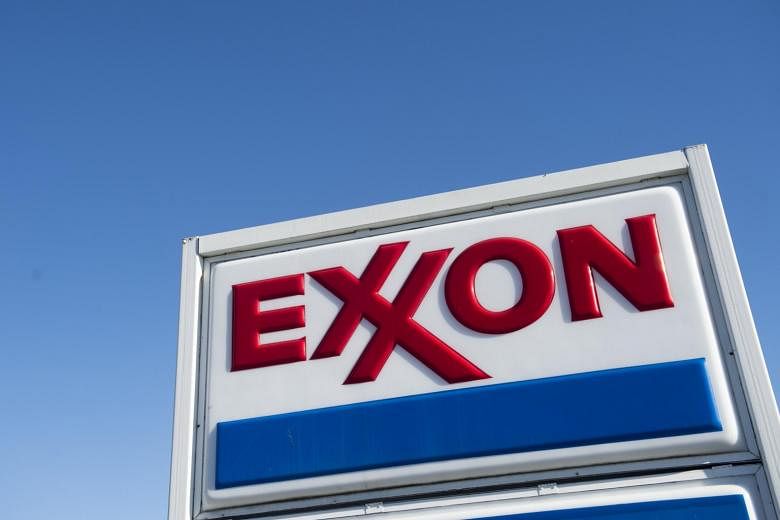NEW YORK (BLOOMBERG) - The dominance of technology companies has eclipsed every other story in 2020's pandemic-upended stock market. Now its forcing a reordering of the world's most famous stock benchmark.
In the biggest reshuffling in seven years, Exxon Mobil, Pfizer and Raytheon Technologies were kicked out of the Dow Jones Industrial Average, moves that will boost the influence of technology companies that have dominated the 2020 stock market.
Salesforce.com, Amgen and Honeywell International will enter the 124-year old equity gauge a week from Tuesday (Aug 25) today, its overseers said. The actions were prompted when Apple - which is currently 12 per cent of the 30-stock index - announced a stock split that effectively reduced the sway of computer and software stocks in the price-weighted average. Apple is worth more than US$2 trillion (S$2.7 billion).
The changes mark a stunning fall from grace for Exxon, the world's biggest company as recently as 2011, whose ejection reflects the steady decline of commodity companies in the American economy. The moves represent an equally significant embrace of technology companies, whose giant rallies have frequently caused the Dow to trail other major indexes this year.
"Those changes are a sign of the times - out with energy and in with cloud," said Chris Zaccarelli, chief investment officer for Independent Advisor Alliance.
The latest reshuffling comes as technology companies have come to dominate the stock market in a trend amplified by this year's Covid-19 lockdowns. While the Dow average is still 4.2 per cent off its February record, the tech-heavy Nasdaq 100 is almost 20 per cent above the pre-pandemic all-time high.
While any change to the Dow is notable, the ejection of Exxon Mobil - the world's biggest company as recently as 2011 - marks a particularly stunning fall from grace, reflecting the decline of commodity companies in the American economy. Worth US$525 billion in 2007 and more than US$450 billion as recently 2014, the stock had fallen in four of six years before 2020 and is down another 40 per cent since January. It's now worth about US$180 billion.
Founded in 1999, Salesforce was one of the best-performing stocks of the bull market following the global financial crisis, rising 27-fold since March 2009. Amgen is among the world's biggest biotechnology companies with a market value of about US$137 billion, though it's replacing a company - Pfizer - that is about US$90 billion larger.
Stocks of the affected companies were quick to price in the shake-up. Shares of Exxon dropped 2 per cent as of 6.10pm in New York, in after-hours trading, while Raytheon fell 3 per cent. Honeywell climbed 3.5 per cent and Salesforce.com rose 4 per cent. Pfizer dropped 1.9 per cent and Amgen rose 4 per cent.
This is the second time a stock split by Apple has had profound consequences for the Dow average. The first was in 2014, when its 7-for-1 split lowered the price of its shares enough to make inclusion feasible. Apple's decision to do it again this year effectively lowered its sway on the price-weighted average, making the influence of technology companies too small in the eyes of the Dow's handlers.
Under-representation of technology companies has occasionally penalised the Dow in 2020, when it has frequently trailed the market-cap weighted S&P 500, whose concentration on megacap companies like Amazon.com and Alphabet has juiced its returns. Neither of those companies are effectively eligible for the Dow given their US$1,000-plus share prices.
The blue-chip index weights its constituents by price rather than market value, making it different from the broader S&P 500. A committee chooses members in an effort to maintain "adequate" sector representation and favours a company that "has an excellent reputation, demonstrates sustained growth and is of interest to a large number of investors", according to its website. Other major indexes add and subtract members on a rules-based process.
Honeywell, meanwhile, is returning to the average after being kicked out 12 years ago to make way for a financial services company, Bank of America, and an energy producer, Chevron. Its shares are down about 9 per cent in 2020 but before that had risen in 10 of 11 years, pushing its market value above US$100 billion.
While the Dow's influence has faded over the years as passive managers linked to benchmarks based on market value, the index remains an exclusive club and still serves as one of the highest profile showcase of American industrial heft. Roughly US$31.5 billion of assets are benchmarked to the Dow, with US$28.2 billion of passively managed funds linked. (The figures are US$11.2 trillion and US$4.6 trillion for the S&P 500)
The last time three companies were added to the Dow was seven years ago, when Visa, Goldman Sachs Group and Nike displaced Bank of America, Hewlett-Packard and Alcoa.

